#increased grocery costs
Explore tagged Tumblr posts
Text
The Benefits and Challenges of Home Cooking During the Pandemic
Overview of the impact of COVID-19 on the food industry The COVID-19 pandemic has had a significant impact on the food industry, affecting everything from how we shop for food to how restaurants operate. The sudden shift towards social distancing and remote work has led to changes in consumer behavior, forcing the food industry to quickly adapt. The shift towards home cooking during the…

View On WordPress
#budget-friendly#burnout#covid-19#dining out expenses#future of food#grocery shopping tips#healthier eating habits#here are some recommended tags for "the benefits and challenges of home cooking during the pandemic":#increased grocery costs#industry impact.#lack of variety#new and exciting recipes#pandemic#pantry staples#quick and easy meals#savings
0 notes
Text
You know what, it’s been almost a week and I’m still mad at how shitty my pay raise was.
#I know rates were agreed on between my union and employer but c’mon#I do twice as much work now and it’s not even $2 more an hour#I know people would look at my annual salary and think it isn’t bad#but like…I lose about 11k in taxes and deductions you fucking walnut#what people need is cost of living wage increases#like whoop de doo this raise means I can buy groceries out of pocket for the first time in years#I’m so tired of scraping by
3 notes
·
View notes
Text
I have to get over this weird guilt of spending money on food.
#like paying bills hurts especially when these mfs increasing shit#but i feel like throwing up from buying groceries when there's nothing in my fridge but condiments and cheap ice cream#and like half my mind is like 'you're spending more than usual stop it'#and i have to remind myself 'yes because you're buying more food than usual so you don't have to call for a ride back to store sooner'#as well as buying paper towels and trash bags. no shit it's gonna cost more#i don't know if i can handle all this. i wish i could rewind
1 note
·
View note
Text
Hey so remember how grocery prices suddenly jackknifed during lockdown and never went back down?
Well turns out the companies would have done that shit either way and had been steadily price-fixing for the last decade!
Washington State Attorney General Bob Ferguson just announced more than $40 million in court-ordained Fuck You money from massive swaths of food production companies are to be paid out to households earning at or below 175% of the federal poverty level ($25.5k for 1 person, $34.5k for 2 people households) before Dec 31st of this year. Happy Holidays.
youtube
"The bottom line here is that my legal team took on two large corporate price-fixing conspiracies that increased the cost for groceries for Washington families. We've prevailed, and as a result, we are sending checks to over 400,000 Washington households."
Cannot stress enough the extent of the conspiracies he's talking about here. 15 out of the total 19 chicken producers got nailed in this lawsuit. Not the total number of conspirators, mind, just the ones who left enough evidence for the AG to kick their ass in so expedient a manner. Make no mistake, all 19 were in on it. The court case against the rest of them has been delayed until October of next year, though. None of them are making it out unscathed.
Tuna didn't escape antitrust horseshit either, because the CEOs of Starkist, Chicken of the Sea, and Bumblebee Tuna had a fucking group chat where they complained that the price of tuna was "too low" and they agreed to artificially inflate the price.
“What’s so maddening about the conduct of these companies is the reason that they engaged in this price-fixing conspiracy was greed. They wanted to make money."

So anyway the AG who nailed their asses to the wall and continues to do so is running for governor. If you live in Washington, could be worth your vote when primary season rolls around.
#news#uspol#monopolies#so hey i guess the world isn't complete bullshit even if the settlement money really shoulda been higher#cause deep down you know they only settled because they knew the money was barely going to be a slap on the wrist#Youtube
22K notes
·
View notes
Text
so. a house in vancouver cost ~ 400k in 1995. which is equal to 725k today. but an avg house in vancouver today is 2.35 million, 3.2x more.
minimum wage in BC in 1995 was $6.50. so just to keep it simple, thats equivalent to ~61,500 hrs worked to earn the avg value of a house.
minimum wage today is $16.75. so ~140,300 hrs worked to earn the value of an average home. 2.3x the amount of hours you wouldve needed in 1995. i already knew this. but doing the math makes me even more upset
#im also being pretty generous cos that 400k avg held until like 2005 when min wage was 8 bucks#and that comes out to 50k hrs#not to mention the insane increases in grocery and rent costs#obviously that cant be factored into my simple calc here#but i imagine an average renter in 1995 could put a lot more away in savings than someone in 2023
1 note
·
View note
Text
‘WHO VOTED FOR THIS?’ : TRUMP OBSTRUCTS CANCER RESEARCH FUNDING Trump has given orders to freeze ALL federally funded medical research in America. This includes research to treat: Cancer, Alzheimer's, Diabetes, Arthritis, Obesity, Drug Addiction, Depression, Childhood Leukemia, Heart Disease, etc. All of us know someone who is a afflicted with a medical condition that science is trying to cure, or at least lessen its severity. Who in their right mind would want to put a freeze on such important work? Notice Trump's priorities. He's not interested in lowering the cost of housing, or reducing middle and lower income Americans' taxes, or the price of groceries. Why? Because he's laser focused on more important stuff like: stopping life-saving medical research, worsening the climate crisis, reigniting inflation by mass deportations, increasing prescription drug prices, and of course, America's most urgent need of all — renaming the Gulf of Mexico. The man needs to have his head examined. Oh, ...darn. He just put a freeze on medical research into finding out what the hell is wrong with him!
#medical research#news#science#trump#politics#government#us politics#America#USA#donald trump#democracy#republicans#democrats#American politics#aesthetic#election#beauty-funny-trippy#Washington DC#vote#voting#presidential election#current events#economy#immigration#asylum seekers#refugees#climate change#environment#biology#medicine
574 notes
·
View notes
Text
The governor was firm: Nebraska would reject the new federal money for summer meals. The state already fed a small number of children when schools closed. He would not sign on to a program to provide all families that received free or cut-rate school meals with cards to buy groceries during the summer.
“I don’t believe in welfare,” the governor, Jim Pillen, a Republican, said in December.
A group of low-income youths, in a face-to-face meeting, urged him to reconsider. One told him she had eaten less when schools were out. Another criticized the meals at the existing feeding sites and held a crustless prepackaged sandwich to argue that electronic benefit cards from the new federal program would offer better food and more choice.
“Sometimes money isn’t the solution,” the governor replied.
.......
The new $2.5 billion program, known as Summer EBT, passed Congress with bipartisan support, and every Democratic governor will distribute the grocery cards this summer. But Republican governors are split, with 14 in, 13 out and no consensus on what constitutes conservative principle.
One red-state governor (Sarah Huckabee Sanders of Arkansas) hailed the cards as an answer to a disturbing problem. Another (Kim Reynolds of Iowa) warned that they might increase obesity. Some Republicans dismissed the program as obsolete pandemic aid. Some balked at the modest state matching costs. Others hinted they might join after taking more time to prepare.
The program will provide families about $40 a month for every child who receives free or reduced-price meals at school —$120 for the summer. The red-state refusals will keep aid from about 10 million children, about a third of those potentially eligible nationwide.
......
As with Medicaid, poor states are especially resistant, though the federal government bears most of the cost. Of the 10 states with the highest levels of children’s food insecurity, five rejected Summer EBT: Louisiana, Oklahoma, Mississippi, Alabama and Texas.
Like the school lunch program, it serves families up to 185 percent of the poverty line, meaning a family of three would qualify with an income of about $45,500 or less.
......
Some Republicans, in rejecting the aid, found critics in their own ranks. After Gov. Henry McMaster of South Carolina dismissed Summer EBT as a duplicative “entitlement,” State Senator Katrina Shealy, a fellow Republican, wrote a column with a Democratic colleague warning that “hunger does not stop during summer break.”
In an interview, Ms. Shealy said the state should not reject $65 million “just because Biden is president,” and perhaps just partly tongue-in-cheek wrapped her plea in Trumpian bunting: “Everyone wants to say, ‘America First’ — well, let’s feed our children first.”
Oklahoma initially said it rejected the program because federal officials had not finalized the rules. But responding to critics, Gov. Kevin Stitt, a Republican, sharpened his attack, calling Summer EBT a duplicative “Biden administration program” that would “cause more bureaucracy for families.”
Tribal governments, which have influence over large parts of the state, stepped in. Already feuding with Mr. Stitt, they promised to distribute cards to all eligible families on their land, regardless of tribal status, while bearing the $3 million administrative cost. The five participating tribes will cover nearly 40 percent of Oklahoma’s eligible children, most of them not Native American.
“I remain dumbfounded that the governor of Oklahoma would turn down federal tax dollars to help feed low-income children,” said Chuck Hoskin Jr., the principal chief of the Cherokee Nation.
-------------------------
some of the most stunning highlights of this story.
All I got to say is, let's feed the children? every single Democratic Governor took the money to feed the kids, every governor who rejected it, every single one, is a Republican. If you don't vote for Democrats you are STEALING food out of kids mouths.
2K notes
·
View notes
Text
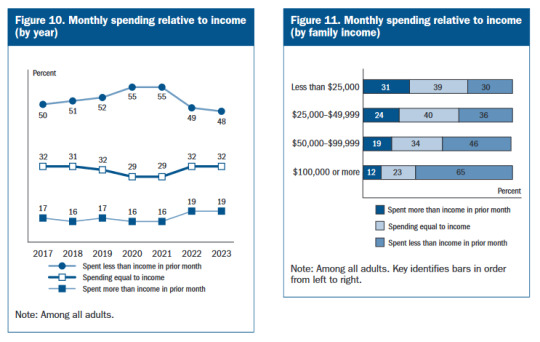
if we're like, showing graphs and stuff, this is the type that i think a lot of people on tumblr are thinking of when they think about the economy.
Only one third of people with family incomes below $50k spent less than their income each month. I would guess that a lot of people on tumblr who get aggro about this topic (and the vast majority of people on r/povertyfinance, who discuss this sort of thing a lot) fall into this earning category.
Real wage increases only matter if you got a raise (one third of workers got a raise last year, which means that 2/3rds didn't - included in the economic wellbeing report linked above). Whether or not rent is outpacing wages only matters if you're not going to be rent burdened (more than a third of renter households are cost burdened in every state and 12 million rental households spend more than half their income on rent). Employment rates lose a lot of meaning when you're working multiple jobs to make ends meet (the percentage of multiply employed workers was falling in the US from 1996 to the 2010s, when it plateaued, then it started rising slightly then collapsed in 2020 and has been rising steeply since then and it's too soon to tell if it's going to go back to the plateau or keep going up).
Four in ten adults in the US is carrying some level of medical debt (even people who are insured) and 60% of people with medical debt have cut back on food, clothes or household items; about 50% of people with medical debt have used up all their savings.
Tumblr is the broke people website and yeah, people who are working two jobs to afford $900 for one room and utilities in a three bedroom apartment are not going to feel great about the economy even if real wages are raising and inflation-adjusted rents are actually pretty stable. "The Rent is too Damn High" has been a meme for 14 years so, like, yeah. Even if it's pretty stable when adjusted for inflation it is stable and HIGH.
It's hard to feel good about the economy when you're spending the last few days of the pay period hoping nothing unexpected hits your account, and it's VERY frustrating to be told that the economy's doing well when you've had to start selling blood to buy groceries.
Sure, unemployment is low, that's neat. It's good that inflation has stabilized (it genuinely has; prices are not likely to fall back to pre-inflation rates and eventually you'll likely be paid enough to reach equilibrium, but a lot of people aren't there yet).
But, like, it costs eight thousand dollars a year out of pocket to keep my spouse alive. I'd guess that we've paid off about a third of the 40-ish thousands of dollars he's racked up since his heart attack. His medical debt is why I don't have a retirement plan beyond "I guess I'll die?" So talking about how good the economy is kind of feels like being chained in the bottom of a pit that is slowly filling with water while people on the surface talk about the fact that the rain is tapering off. Neat! That's good! But I can't really see it from where I'm standing.
Inflation really is getting better. My state just enacted a $20 minimum wage for fast food workers. The Biden administration has worked hard to reduce many kinds of healthcare costs. A lot of people have had significant portions of their student debt cancelled.
But a lot of people are still having trouble affording groceries and it doesn't seem helpful to say "your perception of the economy is decoupled from the reality of the economy" on the "can I get a few dollars for food today?" website.
561 notes
·
View notes
Text
In a lot of foreign countries, they have this neat amusement park ride. It's called "train," and it consists of a bunch of boxes you sit in and it takes you up and down a track. I could ride train all day long, through the incredible views of places that aren't the suburban-bordering-on-industrial wasteland that I live in.
Unfortunately for me, visiting train often requires me to get on an airplane, which is a big cylinder that flies through the sky. Despite being arguably similar to a train, it costs a whole lot more and smells kind of funny the whole time. Just not worth it, which is why I have attempted to get train at home.
Now, my local politicians dislike train. Perhaps you live in a country where your politicians are accountable to you, which is a terrifying prospect if you are a useless child of privilege who wants to spend a couple years of your life making friends with billionaires instead of being asked frightening questions about basic arithmetic. That is not the case here, where politicians are born in some sort of special vat, receive their law degrees, and come up with ideas like "what if school is actually hurting children?" We do not have many points of agreement, mostly because they drive new cars. Sometimes, they make someone else drive their car for them, which is a concept demonstrating just how sick things have become in their pointy little Hapsburg heads.
To them, there is no room for the laugh-a-minute thrill ride that is train. There is nothing amusing about the business of laying down roads that they then poorly maintain, a hyperfixation that occupies approximately ninety-six percent of their emailing-and-yelling time. Personally, I think if they really actually liked driving so much, they would put a couple hairpin turns or at least a nice high-speed chicane on my nineteen-minute drive to the grocery store, but that's a rant for another time. The government was not going to give me a train, so I had to do it for myself.
The best part of a train is that you can put a bunch of cars together, but not all of those cars have to have running and driving engines! With just a handful of purloined U-Haul® trailer hitches and a very heavy right foot, I was soon escorting seven-car public transit through the middle of downtown. Sure, if you look closely, you might argue that a bunch of welded-together Oldsmobile Aleros are not exactly up to the comfort of futuristic European rail, but we're hoping to be able to upgrade to some kind of haggard Japanese minivans in the next couple quarters, once fare revenue increases from the current value of "zero dollars." In my defence, it's not as much fun to play train-driver-guy if you're constantly asking people for money.
631 notes
·
View notes
Text
What's New Experts are warning of a looming increase in grocery prices as agricultural soil becomes increasingly unproductive. In a concerning trend that could impact households across the globe, the combination of overfarming, climate change and insufficient sustainable practices has left vast swaths of farmland degraded and unproductive, threatening food supply chains and driving up costs. The United Nations Food and Agriculture Organization (FAO) estimates that 33 percent of the Earth's soils are already degraded and more than 90 percent could become degraded by 2050. Why It Matters According to the FAO, soil erosion "occurs naturally under all climatic conditions and on all continents, but it is significantly increased and accelerated by unsustainable human activities (up to 1,000 times) through intensive agriculture, deforestation, overgrazing and improper land use changes. "Soil erosion rates are much higher than soil formation rates," the FAO said. "Soil is a finite resource, meaning its loss and degradation is not recoverable within a human lifespan." A map previously published by Newsweek predicts that 95 percent of America's soil will be degraded in less than 30 years. Only a 5 percent area is marked not degraded.
i absolutely love (/s) how this story is being framed as further price inflation and economic woes being the primary thing to worry about. the worst part of barren food stores isn't related to high prices.
the soil of our earth, our home planet, is dying/being killed by industrial agriculture, and as such we are now struggling to produce food. what this describes is imminent global famine within most of our lifetimes (~30yrs). sticker shock is not the biggest threat. that award goes to malnutrition and starvation.
it's possible to recover from this. but the solutions involved cost money and also winds up reducing overall crop yield, so many farmers aren’t going to pursue these solutions as frequently because they just aren’t feasible. the biggest concern for the average farmer is economic viability. point blank.
thus, any efforts at taking even baby steps to solve this problem will require centralized governments, particularly in the west, to enact direct, formative changes. unfortunately, all of them happen to be collapsing at this very moment. so... hang on tight, i suppose.
#world news#climate change#news#climate#environment#agriculture#united states#us news#god damn typo fucking shit ass bitch
239 notes
·
View notes
Text
How wrong words become wrong numbers
There's a viral video of nurses saying "this is me 12 hours before my shift" looking nice, then "this is me 12 hours after my shift," looking haggard and tired.
The implication is nonsense--12 hours before and after your shift is when you're in bed, at the grocery store, or on another shift. Why are you looking so tired if your shift ended 12 hours ago?
OK, I understand, I know what they meant, I get it! They meant to say "before and after my 12-hour shift." That is the only logical explanation. It's fine! I get the joke! No hate!
I know some people do not care how numbers work and want to tell me "you must be fun at parties! You and your technicalities! Those two sentences mean the same thing! You can't expect regular people to know the difference between two sentences that have most of the same words in them!"
But like...I...think you generally should try to understand numbers...
Imagine if you're on a dose of a medication that is 100 milligrams/day. Through reasonable testing and logic and...however medical professionals decide these things...it is decided your dose should be increased by 25%. Great.
Imagine one of these nurses wrote down that your dose should be 25 times what it was. Now you're taking 2500 milligrams or 2.5 grams per day.
And now you're dead.
Or it could be something even simpler.
"OK Mrs. Fancy Pants!" says the hypothetical innumerate nurse. "It's not my fault the pharmacist is too dumb to know what I mean when I say 25 times! Fine, I'll write the new dose should be 25 percent of what it was! Happy?"
Now your dose is 25 milligrams per day. It was supposed to be 25% more than 100 milligrams/day, which is 125 milligrams/day. You're dead again!
"But I'm not a doctor so it doesn't matter!"
It might matter to you one day. What if you're the one taking the pills? The doc says one pill every two days, and that sounds like the same thing as two pills every one day, right? Nope! DEAD AGAIN!
There are also many examples of scamming people because they don't understand numbers. It would be pretty unwise to sign a lease agreement that simply said "rent is 900." If my friend told me that, I would assume they mean "rent costs USD$900.00 per month." I understand the implication between trusted friends and casual conversation!
But in a contract with someone sketch? Maybe they mean 900 Bitcoins per minute. Some things have to be specific.
There is actually a whole scammy-ass company, ClickaSnap, that banks on the idea that their audience doesn't understand the difference between a dollar and a penny. It sounds like a mistake that no one would make, but they are fairly sneaky about it. In this video, the videographer says, "They're going to pay you 90 cents per view per photo." Wow, that's a lot!
The image on the screen says, "up to 0.90 cents per view." The "up to" has a lot of qualifications, including paying them a monthly subscription, and they don't say why anyone would go to that website to look at pics anyway. And what's that decimal doing there? Does a decimal...change a number?
It's not 90 cents per view. It's .9 cents per qualified view. That is 9/10ths of a penny. (The same mistake is here and there were a bunch more but I think TT took some down.) I understand it's probably because 90 cents is sometimes written as $0.90--yes, those are the same--but that dollar sign is important! 0.90 DOLLARS is different than 0.90 PENNIES.
Anyway! Just wanted to warn you to be careful of the interactions between numbers and words, especially when it's important!
156 notes
·
View notes
Text
To talk about monopoly & antitrust, I want to start off with your first day in Econ 101, when you learn "how prices work". The toy model that nearly everyone learns as one of the first things ever is that classic supply-and-demand graph of price and quantity; you know it, I don't need to show it. And in relation to how firms set price in a market, the explanation you get is something like:
"In a world with perfect information, zero transaction costs, rational agents, and no barriers to entry, new firms and/or increased output will enter the market until marginal price equals marginal cost"
This (seemingly) portrays a model where new companies "entering the market" is how prices go down. Like say there are Firms A, B, and C, engaging in oligopolistic pricing for a normal good; what happens is some new Firm X (with the same production costs) emerges with the sole business strategy of "offer prices lower than them because they are skimming" and it drives everyone's prices down in a race to the bottom. That, in a sense, competition between identical firms drives the price equilibrium.
That isn't very true, not in practice and not even theoretically; the 101 stuff just sort of biases you to see it that way. Firm X above is being rational in one way but silly in others; why would it enter a market where its competitors are making healthy profits just to fuck that up, knowing it has no advantage they can't immediately replicate in response? And pay all the fixed costs other firms have already paid to make that 0.1% profit? In real life firms almost never do this, they compete over (actual or perceived) advantage or market segmentation. And it also means that - if all firms are truly the same in a market - cooperating on price, far from being aberrant behavior, is the natural thing to do. Why would I look at my rival firm and lower my price to "undercut" them, knowing that they 100% can just lower it too? We both lose, immediately. In practice, companies often set their prices by looking at the prices of competing firms and matching them!
Many things actually drive the price equilibrium of course, but one of the biggest - and most useful for our purposes - is the substitution effect. If companies defacto cooperate on prices all the time, why is the price not infinity? Well because if you are selling steaks and set the price to infinity, I'm not gonna buy it! I can just buy chicken, for me it's pretty much the same. And chicken is cheaper to make than steak. As a chicken firm, I totally can set my price under your steak and you can never, ever match it; that is a real advantage, one from asymmetries of production. The price of steak is driven by the need to compete with chicken much more than it is driven by the need to compete with "other steaks". And so on down a chain of a million desires and costs and needs.
So to wrap this around to antitrust, there is a common idea out there that monopolistic pricing is increasing from the past because if I look at different industries, so many of them today are consolidated into 2-3 big firms. Your grocery stores are all Giant or Safeway or w/e it is in your city, if you are buying a TV Samsung & LG are half the entire US market. How could these companies not collude on price? Of course they do, and they don't need explicit agreements that would violate extant FTC regulations to do it; they can just softly communicate and feel out cooperation. So you gotta break them up and change the rules so they can't do that.
The trap is thinking this is any different if it was 10 firms - it really isn't! Maybe marginally, sure, and if it was 2000 firms yeah okay the sheer chaos would probably create some price churn; but in the past prices were not driven down by the diversity of firms making price cooperation impossible. The long history of guilds, business associations, chambers of commerce, and so on shows that they had plenty of avenues for cooperation - and often did straight-up set prices. Meanwhile, when Wal-Mart, Target, Aldi, and others all cut prices at around the same time, they are not mainly competing with each other. If they were they would just mutually agree to not do that, without even saying anything! How stupid do you think they are? That isn't hard to do. Instead they are competing with Amazon; with boutique local stores; with restaurants; with the changing price of labor; with shifting consumer sentiment and expectations. The industry concentration doesn't matter.
Until it does of course! Because what is the substitution good for oil? They exist of course, but they ain't cheap; people will still buy gas at gigantic ranges of prices. Here, the fundamental structure of the market is monopolistic - and also a geopolitical clusterfuck, but let's not get into that. Producers openly rig prices sometimes, and antitrust actively regulates against it, and it is a hot mess of governments and companies and all that. Are people who hold patents engaging in monopoly pricing? Obviously, that is the point of patents! It is by design; but there are tons of arguments to be made around creeping exploitation of the IP system. Sometimes hundreds of firms in a dominant market niche will offer complex, bundled products where the price of each piece of obfuscated and the value is subjective, but consensus is you can't not buy the product or you will be screwed and since you can't tell what the product even is, let alone how valuable it is, you can't object when they set the price - I hear these are called "universities", but they go by other names in other sectors.
All of the above are something like "monopolies", which maybe are getting worse over time, but they are monopolies for different, product-specific reasons. I think there is a good deal of FTC work and other reforms that could be done in the US to identify areas where this kind of rent extraction is happening. But what it doesn't look like is opposing blanket industry consolidation. And in fact the correlation is honestly pretty weak. Because identical firm competition does not drive the price equilibrium.
#antitrust discourse#This is not a review of Biden's FTC policy - they are aware of this reality at least in part#This is obliquely a critique of Matt Stoller he is not aware of this
198 notes
·
View notes
Text
Adding To or Starting a Garden
AKA, the beginning of the Plants-Related section of this series.
This is my third post in a series I’ll be making on how to increase biodiversity on a budget! I’m not an expert--just an enthusiast--but I hope something you find here helps!
Got an area of lawn you’d like to convert to a wildlife haven? An area you can stick some hanging baskets in? Want to know how your garden of tomatoes and zucchinis is already putting in a lot of work? This is the section for you!
It would be dumb of me to not acknowledge that the act of gardening can come with a lot of costs. Buying seeds, buying plants, buying soil, raised bed materials, mulch, etc. … it can all get a bit daunting, let’s be honest! But there’s quite a few ways to get seeds and plants for free or extremely cheap, which I’ll be addressing in this section! The next section will be all about addressing the other Costs in gardening and how to mitigate or eliminate them entirely.
Also, do keep in mind; there’s no need to try and convert a whole area from lawn to garden or unused to garden at once. In fact, it could actually be extremely beneficial to do it a little at a time--maybe four or five square feet to start out.
Front Lawn (or Managing Principles)

If you live in a place where you’re required to have a grass turf lawn (HOA’s come to mind…), try replacing it with native grasses instead! You could even possibly use a low-growing ground cover plant like clover to a similar effect! Reseeding/replacing an entire lawn can be a big upfront cost, but even just letting the lawn be a little messy and tall helps. If the lawn gets patchy, leave the bare spots for a little while and something different will likely pop up! Pioneer species will fill the gaps and provide benefits to other plants around them, support animals, and more! If you want to take the guesswork out of it, you could always research what the pioneer species are in your area and plant the ones you like most.
Obtaining Seeds for Cheap or Free
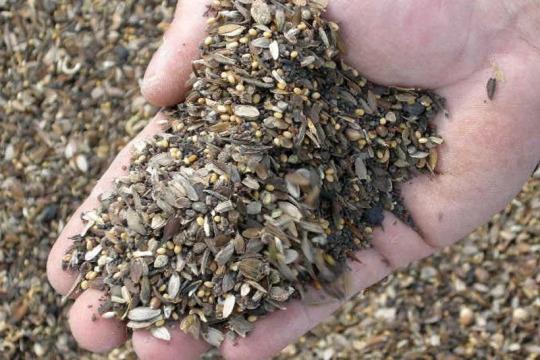
The cheapest way to start a garden is by far via seeds. However, seeds can be a bit complicated to grow, and some sources make them… way overpriced. Fortunately there are ways to get seeds for little to no cost!
Some places sell seeds for as low as a dollar, 50 cents, or 25 cents! The packets may not have a lot of seeds, but it’s definitely a good start for a low budget! I’ve personally bought cheap seed packets at Walmart--the Ferry-Morse and Burpee brands are not what we’re looking for here. Typically the cheaper ones I’ve found are American Seed (which is owned by Green Garden Products, which also owns Ferry-Morse, Livingston Seed, McKenzie Seed, and Seeds of Change. Do with that information what you will), but they’re rarely stocked near the Ferry-Morse ones in the Formal Gardening Section. I’ve most often found them on end caps near the gardening section, so you may have to weave through a few aisles to find them, but once you do there’s an array of flower and vegetable seeds to select from! Alternatively, I’ve found seeds at Dollar Tree sold 2 or 4 for a dollar in Spring as part of their seasonal product; however, when they’re out of stock, they’re typically out of stock for the year. Try to check them out early in the year!
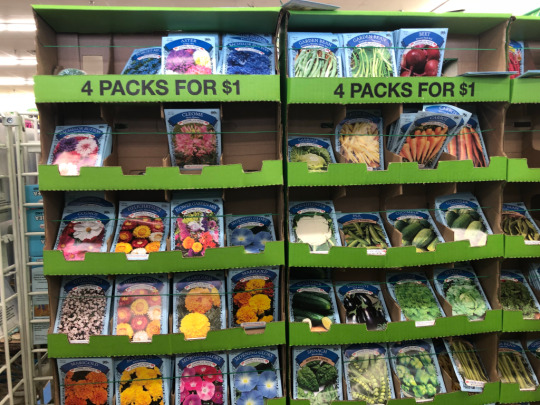
Otherwise, other seed companies like Urban Farmer or Botanical Interests will often have semi-frequent sales in spring and fall, when people are stocking up on seeds--joining their email lists can help you be the first to know when a good sale is going on!
Some foods from grocery stores will provide seeds that you can use in the garden as well. I’ve had the most luck with store-bought bagged beans, peppers, and tomatoes. Some people have had luck with watermelons, apples, citrus, squash, and more. Do keep in mind that you likely won’t get the same variety of fruit/vegetable as the one you bought--the resulting plant may look different and taste different.

Give it a shot! Pick some beans you like--if they don't grow well, at least you can eat the rest!
If you live in the US, food-producing live plants, bare roots, and seeds can often be purchased with SNAP benefits. But what does growing fruits, veggies, and herbs have to do with boosting biodiversity? While food crops aren’t typically native, they still provide valuable shelter for native insects. Some plants even have intricate relationships with native fauna--like the squash bee, a solitary bee which exclusively pollinates cucurbits like pumpkins, squash, and zucchini. And we get to benefit more directly as well! If you’re planting a diverse range of foods in your garden (as opposed to the swaths of single-plant farms that typically produce what’s sent to grocery stores), you’re supporting high levels of biodiversity by providing a variety of plants for creatures to live and hunt around.

Most of the time, when we think of boosting biodiversity with a garden, we think of a colorful flower garden teeming with pollinator species. However, if we’re striving to use native species, it can be a bit difficult to find some species in stores. I can say from experience that trying to find any wildflower seeds other than butterfly weed, purple coneflowers, and black-eyed-susans is… challenging, if you limit yourself to stores like Walmart, Home Depot, and Lowe’s. You might occasionally get lucky with an ACE Hardware or a local nursery, but even then sometimes it can be hard to track down who in your area is selling what--let alone if you live in an area where no one really is selling native plants or their seeds. Not to mention, even once you find a local or online store selling the seeds you want, they can sometimes cost a pretty penny. So what do you do?
If you have the option to, consider gathering native seeds yourself! Get good at identifying the native flora and fauna--or at least, a few target plants and their lookalikes--and get ready to go! Learn where they tend to grow, when they’ll be seeding, etc. Try to identify the plant before it goes to seed (for most plants, it's easiest to identify when flowering), then check back regularly to gather seeds. Typically, if I want to learn how to collect seed from a specific plant, I just search it on Google or YouTube--oftentimes, I'm lead to the GrowItBuildIt Youtube page, so it may be a helpful resource for you as well! Of course, make sure to leave plenty of seed behind so the wild population can repopulate, and seed can feed other creatures in the area. A good rule of thumb is to take no more than 1/3rd of what's available.

Buying seed in bulk is an option if you can afford the upfront cost. Try teaming up with a few friends to buy some bulk seeds and split them amongst yourselves--you’ll get tons of seed! Prairie Moon is a popular site that'll sell seeds by the pound if you can afford the price--though they're in the US, and I believe they focus on Midwest and East Coast natives.
If you want to cheat the system, don’t buy bulk sunflower seeds--buy bags of sunflower seeds being sold as birdseed. They’re typically all black oil sunflower seeds, but they’ll sprout, and they’re fairly cheap for the amount you get!

However, beware generic wildflower seed mixes! Many brands like to sell wildflower seed mixes in big box stores like Home Depot, Target, or even Dollar Tree, but they’ll often include flowers that aren’t native or possibly even invasive in your region! Before you make any purchases, double check to make sure the contained seeds won’t do more harm than good! A quality source of native seeds will provide English and Latin names for all seeds included, and will be native to the region or at least non-invasive.

See this? I don't trust this.
There’s a good handful of programs online that’ll send you free seeds if you’re planning to start a native habitat project! Poke around online and see what you can find; you might get lucky! The best time to start looking for these is fall and winter, I find--by early spring, many of them are either done or beginning to wind down... though some also start up in spring. Ultimately--just check regularly! You never know what you can find!
Other Ways to Get Plants
Don’t want to start from seed? That’s fair! You can try cuttings! Just be sure not to take too much of the plant while you do so. Make sure you’ve gotten a few leaf nodes on your cutting, and cut any flowers you may have gotten. Make sure to leave some blooms and foliage on the original plant for the creatures in the current habitat--you don’t want to destroy one habitat to make another in your garden. There’s tons of methods of rooting cuttings, many of which have different efficacy rates for different plants, but that’s a topic for another post.
If you find seedlings growing in a place where they won’t be able to sustain themselves long-term, or are in danger of being destroyed, consider relocating them! You may be able to gently dig up and transplant the seedling to your garden. Don’t do this if they’re in a place where they can easily survive--ideally, you’ll be taking plants from sidewalk cracks, heavily maintained public gardens, roadsides, etc. Do be careful while doing this--ensure your safety first!

You’re totally allowed to join gardening communities like clubs, facebook groups, and more before you’ve even put a trowel to the dirt. These are great places to learn information and advice! Many gardeners are more than happy to help out a new gardener, and will eagerly provide seeds, cuttings, or even baby plants! Talk to some people about your gardening journey and what you’re hoping to do, and you just might find some kindred spirits--or at least get more people interested in the topic!
Seed and plant giveaways and trades happen all the time in gardening clubs, as well as online! Just poke around and see what you can find! Some are explicitly trades, meaning you’re expected to send something in return, but once you get your feet on the ground with some plant knowledge you’ll be stellar! You may be able to explain you’re just starting out, and someone may send you seeds without expecting a trade, but I’d suggest trying giveaways first.
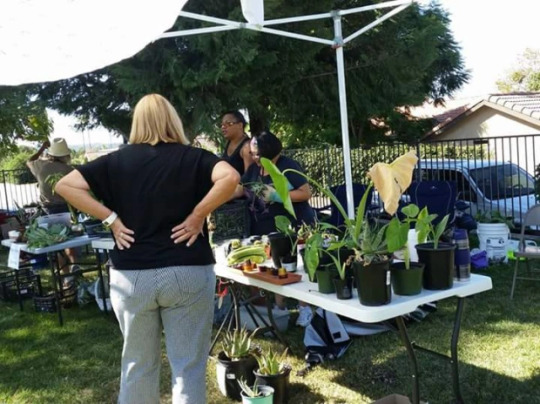
Poke around online and see if there’s a local chapter of your state’s native plant society. From there, you’ll likely be able to find a calendar of events--many of them will host plant sales in the spring, with a bunch of native plant seedlings ripe for the pickings if you can make it out and have some money to spare! Fair warning, though, you’ll want to get there early if you can. If they say they’re starting at 10, try to get there by 9:45. Year after year, there’s always record turnout, and they sell out of plants faster than ever. Just trust me on this. I’ve been let down; hopefully you won’t have to be.
Some libraries are beginning to host seed libraries! Check around and see if your library has one! Ideally, the system works best if you also have seeds to contribute in return, but if you’re just starting out I’m sure they won’t mind you taking some seeds! Just consider saving some seeds to contribute in the future and pay it forward. If your library doesn’t have a seed library? Consider asking if they’d be willing to start one! Community interest is a great way to get the ball rolling on projects like these, but they’ll only know the community is interested if the community tells them they’re interested!
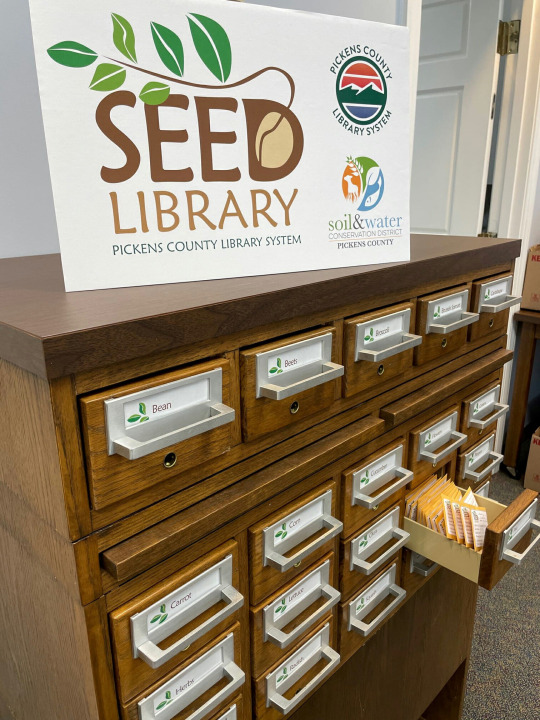
Volunteer to Garden for/with Someone Else
Maybe someone in your area wants to garden, but is struggling to find the time/energy. Many elderly people who used to garden simply can’t anymore but still would like a garden. Other people may love to have a helping hand in their garden. You might even find a few people in your area interested in renting and sharing a community garden plot with others, so they don't have to handle it all on their own! They may be interested in increasing biodiversity right now, or may be willing to if it’s brought up to them. You might be just the kind of person someone needs! Since it won't be your garden, you’ll likely need a bit of permission and collaboration to get anything in particular going, but it’s worth a shot and a way to maybe even make friends!
Again, your mileage may vary with some of these. You may not know where there's a bunch of wildflowers growing in your area, or maybe your local library doesn't have a free seed library. That's okay! Do what you're able to, find what you can find, get what you can get! And there's never any shame with starting small--in fact, starting small can make the project easier to manage and expand when you're able!
That's the end of this post! My next post is gonna be about ways to start growing plants cheaply--low cost seed starting set ups, essentially. There's a lot of good options, many of which I've used myself even! Until then, I hope this advice is helpful! Feel free to reply with any questions, success stories, or anything you think I may have forgotten to add in!
#biodiversity#solarpunk#gardening#outdoor gardening#growing from seed#ani rambles#out of queue#the biodiversity saga#i will be honest I have never flat out approached people to offer to help them garden#HOWEVER. People HAVE approached ME asking ME to help THEM with/plan THEIR garden#granted it was after I'd been gardening for a good few years. and its mostly family or family friends but yknow#people would be like 'oh wanna help me with my veggie garden?' even before I tried growing vegetables#i don't think the library near me has a seed library but you just wait until i. get the courage. to go to the library regularly.#i've seen people also make their own little seed library structures kinda like a little free library but like#i dont think my neighborhood is about that life.#if any of yall have those though it could be a great resource! also send pics because I love seeing them#not to say that this post should become a giant seed trade but if it did become that i would be the opposite of mad#if there's any typos blame my sister shes got the hotel room at like 60-something degrees and I am FREEZING#welp time to shut up now bye
1K notes
·
View notes
Text
The cod-Marxism of personalized pricing
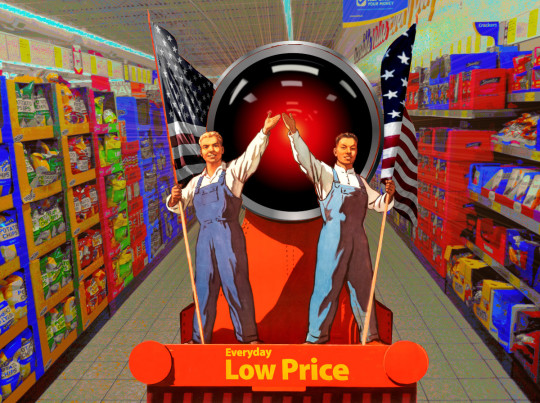
Picks and Shovels is a new, standalone technothriller starring Marty Hench, my two-fisted, hard-fighting, tech-scam-busting forensic accountant. You can pre-order it on my latest Kickstarter, which features a brilliant audiobook read by Wil Wheaton.

The social function of the economics profession is to explain, over and over again, that your boss is actually right and that you don't really want the things you want, and you're secretly happy to be abused by the system. If that wasn't true, why would your "choose" commercial surveillance, abusive workplaces and other depredations?
In other words, economics is the "look what you made me do" stick that capitalism uses to beat us with. We wouldn't spy on you, rip you off or steal your wages if you didn't choose to use the internet, shop with monopolists, or work for a shitty giant company. The technical name for this ideology is "public choice theory":
https://pluralistic.net/2022/06/05/regulatory-capture/
Of all the terrible things that economists say we all secretly love, one of the worst is "price discrimination." This is the idea that different customers get charged different amounts based on the merchant's estimation of their ability to pay. Economists insist that this is "efficient" and makes us all better off. After all, the marginal cost of filling the last empty seat on the plane is negligible, so why not sell that seat for peanuts to a flier who doesn't mind the uncertainty of knowing whether they'll get a seat at all? That way, the airline gets extra profits, and they split those profits with their customers by lowering prices for everyone. What's not to like?
Plenty, as it turns out. With only four giant airlines who've carved up the country so they rarely compete on most routes, why would an airline use their extra profits to lower prices, rather than, say, increasing their dividends and executive bonuses?
For decades, the airline industry was the standard-bearer for price discrimination. It was basically impossible to know how much a plane ticket would cost before booking it. But even so, airlines were stuck with comparatively crude heuristics to adjust their prices, like raising the price of a ticket that didn't include a Saturday stay, on the assumption that this was a business flyer whose employer was footing the bill:
https://pluralistic.net/2024/06/07/drip-drip-drip/#drip-off
With digitization and mass commercial surveillance, we've gone from pricing based on context (e.g. are you buying your ticket well in advance, or at the last minute?) to pricing based on spying. Digital back-ends allow vendors to ingest massive troves of commercial surveillance data from the unregulated data-broker industry to calculate how desperate you are, and how much money you have. Then, digital front-ends – like websites and apps – allow vendors to adjust prices in realtime based on that data, repricing goods for every buyer.
As digital front-ends move into the real world (say, with digital e-ink shelf-tags in grocery stores), vendors can use surveillance data to reprice goods for ever-larger groups of customers and types of merchandise. Grocers with e-ink shelf tags reprice their goods thousands of times, every day:
https://pluralistic.net/2024/03/26/glitchbread/#electronic-shelf-tags
Here's where an economist will tell you that actually, your boss is right. Many groceries are perishable, after all, and e-ink shelf tags allow grocers to reprice their goods every minute or two, so yesterday's lettuce can be discounted every fifteen minutes through the day. Some customers will happily accept a lettuce that's a little gross and liztruss if it means a discount. Those customers get a discount, the lettuce isn't thrown out at the end of the day, and everyone wins, right?
Well, sure, if. If the grocer isn't part of a heavily consolidated industry where competition is a distant memory and where grocers routinely collude to fix prices. If the grocer doesn't have to worry about competitors, why would they use e-ink tags to lower prices, rather than to gouge on prices when demand surges, or based on time of day (e.g. making frozen pizzas 10% more expensive from 6-8PM)?
And unfortunately, groceries are one of the most consolidated sectors in the modern world. What's more, grocers keep getting busted for colluding to fix prices and rip off shoppers:
https://www.cbc.ca/news/business/loblaw-bread-price-settlement-1.7274820
Surveillance pricing is especially pernicious when it comes to apps, which allow vendors to reprice goods based not just on commercially available data, but also on data collected by your pocket distraction rectangle, which you carry everywhere, do everything with, and make privy to all your secrets. Worse, since apps are a closed platform, app makers can invoke IP law to criminalize anyone who reverse-engineers them to figure out how they're ripping you off. Removing the encryption from an app is a potential felony punishable by a five-year prison sentence and a $500k fine (an app is just a web-page skinned in enough IP to make it a crime to install a privacy blocker on it):
https://pluralistic.net/2024/08/15/private-law/#thirty-percent-vig
Large vendors love to sell you shit via their apps. With an app, a merchant can undetectably change its prices every few seconds, based on its estimation of your desperation. Uber pioneered this when they tweaked the app to raise the price of a taxi journey for customers whose batteries were almost dead. Today, everyone's getting in on the act. McDonald's has invested in a company called Plexure that pitches merchants on the use case of raising the cost of your normal breakfast burrito by a dollar on the day you get paid:
https://pluralistic.net/2024/06/05/your-price-named/#privacy-first-again
Surveillance pricing isn't just a matter of ripping off customers, it's also a way to rip off workers. Gig work platforms use surveillance pricing to titrate their wage offers based on data they buy from data brokers and scoop up with their apps. Veena Dubal calls this "algorithmic wage discrimination":
https://pluralistic.net/2023/04/12/algorithmic-wage-discrimination/#fishers-of-men
Take nurses: increasingly, American hospitals are firing their waged nurses and replacing them with gig nurses who are booked in via an app. There's plenty of ways that these apps abuse nurses, but the most ghastly is in how they price nurses' wages. These apps buy nurses' financial data from data-brokers so they can offer lower wages to nurses with lots of credit card debt, on the grounds that crushing debt makes nurses desperate enough to accept a lower wage:
https://pluralistic.net/2024/12/18/loose-flapping-ends/#luigi-has-a-point
This week, the excellent Lately podcast has an episode on price discrimination, in which cohost Vass Bednar valiantly tries to give economists their due by presenting the strongest possible case for charging different prices to different customers:
https://www.theglobeandmail.com/podcasts/lately/article-the-end-of-the-fixed-price/
Bednar really tries, but – as she later agrees – this just isn't a very good argument. In fact, the only way charging different prices to different customers – or offering different wages to different workers – makes sense is if you're living in a socialist utopia.
After all, a core tenet of Marxism is "from each according to his ability, to each according to his needs." In a just society, people who need more get more, and people who have less, pay less:
https://en.wikipedia.org/wiki/From_each_according_to_his_ability,_to_each_according_to_his_needs
Price discrimination, then, is a Bizarro-world flavor of cod-Marxism. Rather than having a democratically accountable state that sets wages and prices based on need and ability, price discrimination gives this authority to large firms with pricing power, no regulatory constraints, and unlimited access to surveillance data. You couldn't ask for a neater example of the maxim that "What matters isn't what technology does. What matters is who it does it for; and who it does it to."
Neoclassical economists say that all of this can be taken care of by the self-correcting nature of markets. Just give consumers and workers "perfect information" about all the offers being made for their labor or their business, and things will sort themselves out. In the idealized models of perfectly spherical cows of uniform density moving about on a frictionless surface, this does work out very well:
https://pluralistic.net/2023/04/03/all-models-are-wrong/#some-are-useful
But while large companies can buy the most intimate information imaginable about your life and finances, IP law lets them capture the state and use it to shut down any attempts you make to discover how they operate. When an app called Para offered Doordash workers the ability to preview the total wage offered for a job before they accepted it, Doordash threatened them with eye-watering legal penalties, then threw dozens of full-time engineers at them, changing the app several times per day to shut out Para:
https://pluralistic.net/2021/08/07/hr-4193/#boss-app
And when an Austrian hacker called Mario Zechner built a tool to scrape online grocery store prices – discovering clear evidence of price-fixing conspiracies in the process – he was attacked by the grocery cartel for violating their "IP rights":
https://pluralistic.net/2023/09/17/how-to-think-about-scraping/
This is Wilhoit's Law in action:
Conservatism consists of exactly one proposition, to wit: There must be in-groups whom the law protects but does not bind, alongside out-groups whom the law binds but does not protect.
https://en.wikipedia.org/wiki/Francis_M._Wilhoit#Wilhoit's_law
Of course, there wouldn't be any surveillance pricing without surveillance. When it comes to consumer privacy, America is a no-man's land. The last time Congress passed a new consumer privacy law was in 1988, when they enacted the Video Privacy Protection Act, which bans video-store clerks from revealing which VHS cassettes you take home. Congress has not addressed a single consumer privacy threat since Die Hard was still playing in theaters.
Corporate bullies adore a regulatory vacuum. The sleazy data-broker industry that has festered and thrived in the absence of a modern federal consumer privacy law is absolutely shameless. For example, every time an app shows you an ad, your location is revealed to dozens of data-brokers who pretend to be bidding for the right to show you an ad. They store these location data-points and combine them with other data about you, which they sell to anyone with a credit card, including stalkers, corporate spies, foreign governments, and anyone hoping to reprice their offerings on the basis of your desperation:
https://www.404media.co/candy-crush-tinder-myfitnesspal-see-the-thousands-of-apps-hijacked-to-spy-on-your-location/
Under Biden, the outgoing FTC did incredible work to fill this gap, using its authority under Section 5 of the Federal Trade Commission Act (which outlaws "unfair and deceptive" practices) to plug some of the worst gaps in consumer privacy law:
https://pluralistic.net/2024/07/24/gouging-the-all-seeing-eye/#i-spy
And Biden's CFPB promulgated a rule that basically bans data brokers:
https://pluralistic.net/2024/06/10/getting-things-done/#deliverism
But now the burden of enforcing these rules falls to Trump's FTC, whose new chairman has vowed to end the former FTC's "war on business." What America desperately needs is a new privacy law, one that has a private right of action (so that individuals and activist groups can sue without waiting for a public enforcer to take up their causes) and no "pre-emption" (so that states can pass even stronger privacy laws):
https://www.eff.org/deeplinks/2022/07/federal-preemption-state-privacy-law-hurts-everyone
How will we get that law? Through a coalition. After all, surveillance pricing is just one of the many horrors that Americans have to put up with thanks to America's privacy law gap. The "privacy first" theory goes like this: if you're worried about social media's impact on teens, or women, or old people, you should start by demanding a privacy law. If you're worried about deepfake porn, you should start by demanding a privacy law. If you're worried about algorithmic discrimination in hiring, lending, or housing, you should start by demanding a privacy law. If you're worried about surveillance pricing, you should start by demanding a privacy law. Privacy law won't entirely solve all these problems, but none of them would be nearly as bad if Congress would just get off its ass and catch up with the privacy threats of the 21st century. What's more, the coalition of everyone who's worried about all the harms that arise from commercial surveillance is so large and powerful that we can get Congress to act:
https://pluralistic.net/2023/12/06/privacy-first/#but-not-just-privacy
Economists, meanwhile, will line up to say that this is all unnecessary. After all, you "sold" your privacy when you clicked "I agree" or walked under a sign warning you that facial recognition was in use in this store. The market has figured out what you value privacy at, and it turns out, that value is nothing. Any kind of privacy law is just a paternalistic incursion on your "freedom to contract" and decide to sell your personal information. It is "market distorting."
In other words, your boss is right.

Check out my Kickstarter to pre-order copies of my next novel, Picks and Shovels!

If you'd like an essay-formatted version of this post to read or share, here's a link to it on pluralistic.net, my surveillance-free, ad-free, tracker-free blog:
https://pluralistic.net/2025/01/11/socialism-for-the-wealthy/#rugged-individualism-for-the-poor

Image: Cryteria (modified) https://commons.wikimedia.org/wiki/File:HAL9000.svg
CC BY 3.0 https://creativecommons.org/licenses/by/3.0/deed.en
--
Ser Amantio di Nicolao (modified) https://commons.wikimedia.org/wiki/File:Safeway_supermarket_interior,_Fairfax_County,_Virginia.jpg
CC BY-SA 3.0 https://creativecommons.org/licenses/by-sa/3.0/deed.en
#pluralistic#personalized pricing#surveillance pricing#ad-tech#realtime bidding#rtb#404media#price discrimination#economics#neoclassical economics#efficiency#predatory pricing#surveillance#privacy#wage theft#algorithmic wage discrimination#veena dubal#privacy first
288 notes
·
View notes
Note
Curious of your thoughts regarding grocery prices going up in recent months. Do you believe in the conspiracy of Grocer heads coming together to increase profit? Or do you truly believe it’s natural inflation?
They can say its just inflation, but they're also making more money than ever:
So its like even if it was just inflation, they have so much profit, that they could use it to lower costs, and make everyones lives easier, not to mention pay their employees more than minimum wage.
But we all know why they won't do either of those things.
123 notes
·
View notes
Text
A much more effective shop, plus updates
Yesterday, while in a much larger town, I did a bit of grocery stopping. Just a few things to tide us over until we do our first big stock up shop in the city next week. The grocery store I went to has a really good inventory, and I would have loved to get more, but everything was too expensive. What I forgot to do was bring our water jugs for refilling, so I needed to do that today. Being a…

View On WordPress
#cost of living increases#dealing with elderly parents#ejector#family#food#food prices#groceries#plumbing#postaday#septic#shopping
0 notes